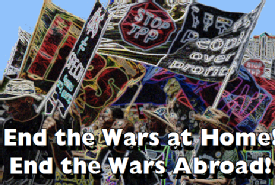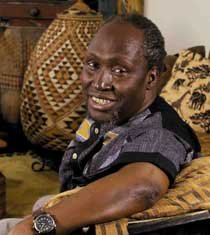War zones topic of daylong symposium at Syracuse University
Event will feature celebrated Kenyan author and activist Ngugi Wa Thiong’o

War zones, both physical and metaphorical, will be explored in a daylong symposium, “Dialogue on Deconstructing War Zones,” Saturday, Feb. 2 from 8:30 a.m. to 5.30 p.m. in Lender Auditorium, located in Syracuse University’s Whitman School of Management building, Room 007. The symposium is free and open to the public. Free parking is available in the Lehman and Harrison lots across the street from SU’s University Avenue parking garage.
The symposium will bring together keynote speakers, panelists, and participants to explore and discuss positive ways of engaging physical war zones, such as Darfur, Congo, Mali, Syria, and Algeria; as well as metaphorical war zones, such as college campuses and local communities, which are sites of ongoing clashes in the war of ideas.
Presented by the Africa Initiative, a part of the Department of African American Studies in Syracuse University’s College of Arts and Sciences, the symposium will feature keynote addresses by internationally renowned activist and author Ngũgĩ Wa Thiong’o, Distinguished Professor of English and Comparative Literature at the University of California, Irvine (9:30 a.m.); SU Chancellor Nancy Cantor (1:15 p.m.); and a closing address by internationally renowned poet, playwright, literary critic, and scholar Mĩcere Gĩthae Mũgo, Meredith Professor for Teaching Excellence in SU’s Department of African American Studies (4 p.m.).
Other invited participants include George M. Langford, dean of The College of Arts and Sciences; Diane Murphy, dean of the David B. Falk College of Sport and Human Dynamics; and SU faculty members A.H. Peter Castro, associate professor of anthropology; Dessa Bergen-Cico, assistant professor in the Falk College; and Silvio Torres Saillant, professor of English.
Also participating are Mukoma Wa Ngugi, assistant professor of English at Cornell University; Syracuse author Jackie Warren-Moore; Onondaga Nation Clan Mother Freida Jacques; members of the Pan-African Community of Central New York; and Andy Mager, Syracuse Peace Council coordinator for Neighbors of the Onondaga Nation (NOON) and the Two Row Wampum Campaign.
The symposium will bring together keynote speakers, panelists, and participants to explore and discuss positive ways of engaging physical war zones, such as Darfur, Congo, Mali, Syria, and Algeria; as well as metaphorical war zones, such as college campuses and local communities, which are sites of ongoing clashes in the war of ideas.
Presented by the Africa Initiative, a part of the Department of African American Studies in Syracuse University’s College of Arts and Sciences, the symposium will feature keynote addresses by internationally renowned activist and author Ngũgĩ Wa Thiong’o, Distinguished Professor of English and Comparative Literature at the University of California, Irvine (9:30 a.m.); SU Chancellor Nancy Cantor (1:15 p.m.); and a closing address by internationally renowned poet, playwright, literary critic, and scholar Mĩcere Gĩthae Mũgo, Meredith Professor for Teaching Excellence in SU’s Department of African American Studies (4 p.m.).
Other invited participants include George M. Langford, dean of The College of Arts and Sciences; Diane Murphy, dean of the David B. Falk College of Sport and Human Dynamics; and SU faculty members A.H. Peter Castro, associate professor of anthropology; Dessa Bergen-Cico, assistant professor in the Falk College; and Silvio Torres Saillant, professor of English.
Also participating are Mukoma Wa Ngugi, assistant professor of English at Cornell University; Syracuse author Jackie Warren-Moore; Onondaga Nation Clan Mother Freida Jacques; members of the Pan-African Community of Central New York; and Andy Mager, Syracuse Peace Council coordinator for Neighbors of the Onondaga Nation (NOON) and the Two Row Wampum Campaign.

About Ngugi Wa Thiong’o
Born in Kenya in 1938, Ngũgĩ Wa Thiong’o burst onto the literary scene in East Africa with the performance of his first major play, The Black Hermit, in Uganda in 1962 as part of the celebration of Uganda’s independence. He went on to write eight short stories, two one-act plays, a column for the Sunday Nation, and three novels—Weep Not Child, published to critical acclaim in 1964; The River Between (1965); and A Grain of Wheat (1967).
Thiong’o was imprisoned in 1977 after a controversial play he wrote and produced, Ngaahika Ndeenda (I Will Marry when I Want), was shut down by the Kenyan government and his novel, Petals of Blood (1977), drew international attention to the nation’s societal inequities. While incarcerated, Thiong’o wrote Devil on the Cross (1981), and Detained: A Writers Prison Diary (1982) on toilet paper. While in Britain for the release of Devil on the Cross, Thiong’o learned of a death plot against him by the Moi dictatorship, which forced him into exile first in Great Britain (1982-1989) and then to the United States.
Thiong’o’s most recent books include his memoirs, Dreams in a Time of War (2010), which chronicles his childhood in rural Kenya; and In the House of the Interpreter (2012) about his teen years and the turbulent changes in Kenya during the 1950s.
Co-sponsors and further information
In addition to The College of Arts and Sciences, co-sponsors include SU’s School of Education, University College, the David B. Falk College of Sport and Human Dynamics, the Martin J. Whitman School of Management, the Maxwell School of Citizenship and Public Affairs, the S.I. Newhouse School of Public Communications, and Hendricks Chapel.
Further information is available by calling the Department of African American Studies at 315-443-4302.
Born in Kenya in 1938, Ngũgĩ Wa Thiong’o burst onto the literary scene in East Africa with the performance of his first major play, The Black Hermit, in Uganda in 1962 as part of the celebration of Uganda’s independence. He went on to write eight short stories, two one-act plays, a column for the Sunday Nation, and three novels—Weep Not Child, published to critical acclaim in 1964; The River Between (1965); and A Grain of Wheat (1967).
Thiong’o was imprisoned in 1977 after a controversial play he wrote and produced, Ngaahika Ndeenda (I Will Marry when I Want), was shut down by the Kenyan government and his novel, Petals of Blood (1977), drew international attention to the nation’s societal inequities. While incarcerated, Thiong’o wrote Devil on the Cross (1981), and Detained: A Writers Prison Diary (1982) on toilet paper. While in Britain for the release of Devil on the Cross, Thiong’o learned of a death plot against him by the Moi dictatorship, which forced him into exile first in Great Britain (1982-1989) and then to the United States.
Thiong’o’s most recent books include his memoirs, Dreams in a Time of War (2010), which chronicles his childhood in rural Kenya; and In the House of the Interpreter (2012) about his teen years and the turbulent changes in Kenya during the 1950s.
Co-sponsors and further information
In addition to The College of Arts and Sciences, co-sponsors include SU’s School of Education, University College, the David B. Falk College of Sport and Human Dynamics, the Martin J. Whitman School of Management, the Maxwell School of Citizenship and Public Affairs, the S.I. Newhouse School of Public Communications, and Hendricks Chapel.
Further information is available by calling the Department of African American Studies at 315-443-4302.
Media Contact
Judy Holmes
